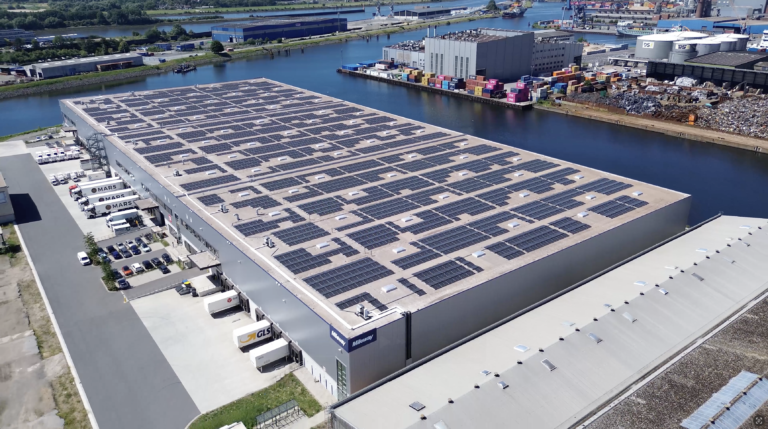Industry Spotlights
What Should You Expect from a Solar Panel Installation?

Industry Spotlights

Switching to solar power is a big step towards cutting energy costs and embracing sustainability with green energy. But what does a commercial solar PV installation actually involve? From the first consultation to flipping the switch, here’s a breakdown of what’s included in a commercial solar panel installation and what to expect at every stage.
A commercial solar PV system comes with more than just panels. Here’s what’s typically included:
Additionally, installers provide essential services, such as feasibility studies, system design, and post-installation support.
Worried about upfront costs? The good news is that financing options, like Power Purchase Agreements (PPAs), make commercial solar installations free to install.
Free Commercial Solar Panels with PPAs
Under a Power Purchase Agreement (PPA), Electron Green installs and maintains the solar system on your property at no cost to your business. Instead of purchasing the system outright, you simply buy the electricity it generates at a lower, fixed rate—helping you reduce energy bills without the capital investment. Here’s how it works:
For businesses that prefer ownership, financing options such as solar loans and leasing can also help spread the cost over time while reaping long-term savings.
By choosing the right financing model, you can achieve the benefits of clean energy without financial strain.
The first step in any successful solar panel installation is the initial consultation. Think of this as the foundation of your solar journey. It’s where your installer takes the time to understand your business’s unique energy needs, goals, and property specifications.
This stage is more than just a conversation. Your installer will likely review your past energy bills to get a sense of your current usage patterns and determine how much energy your solar system should generate to meet your needs. They’ll also discuss the potential benefits of adding features like battery storage or smart monitoring systems for enhanced energy management.
At the end of the consultation, your installer will provide recommendations tailored to your goals, paving the way for a customised solar solution that meets your business’s needs.
After the initial consultation, the next step is the site survey—an essential part of the process that determines whether your property is suitable for a solar panel installation. This is where experts take a closer look at your site to identify opportunities and address potential challenges.
During the survey, the installer will evaluate several key factors to ensure your solar system operates at peak efficiency:
For businesses with unique or complex roof layouts—such as multiple levels, skylights, or limited space—bespoke solutions can be designed to maximise energy production. Ground-mounted systems or carport installations may also be viable alternatives if roof space is insufficient or unsuitable.
After the survey, you’ll receive a detailed report outlining the findings and next steps. This ensures you have a clear picture of your property’s solar potential and how any challenges will be addressed. With all the information in hand, your installer can move forward with designing a solar system tailored to your needs.
Based on the survey results, your installer will design a system that’s customised for your property. This includes choosing the ideal panel type, deciding on the number of panels, and integrating optional features like battery storage. They’ll also determine the best inverter location and wiring plan to optimise performance.
Solar installation involves its share of paperwork, but you’re in good hands. Your installer will handle the entire process, ensuring a smooth and compliant setup. This includes:
With all the technicalities taken care of, you can focus on running your business while your solar project progresses seamlessly.
The big day has arrived! Here’s a detailed breakdown of what you can expect during your solar installation:
Most commercial installations are completed within a few days, depending on the system size, property complexity, and weather conditions. By the end of the process, you’ll be on your way to generating clean, renewable energy with minimal disruption to your business operations.
Before you can start harnessing solar energy, your installer will conduct thorough testing and commissioning to ensure the system is operating safely, efficiently, and as designed. Here’s what the final checks involve:
When everything is signed off and good to go, your business is officially powered by clean, renewable energy—ready to reduce costs and carbon emissions while boosting sustainability.
A reliable solar panel installer will provide ongoing support after installation. Expect a full rundown of system operations, tips for basic maintenance, and access to monitoring tools. Many providers also offer warranties to cover repairs and performance issues, giving you peace of mind for years to come.
Commercial solar installations offer tangible benefits, including significant energy cost reductions, long-term sustainability, and greater energy independence. By understanding what’s included in the process, you can plan confidently and enjoy a seamless transition to renewable energy.
Switching to solar doesn’t have to be overwhelming. With Electron Green, the process is straightforward, ensuring your business reaps the rewards of clean, cost-effective energy.
Ready to take the plunge? Explore your options today.

Read more

For industrial businesses across the UK, industrial solar panels offer a powerful solution—providing cost-effective energy while reducing carbon emissions and environmental impact.
Read more
Why Free Solar for Business Make Financial Sense
Read more